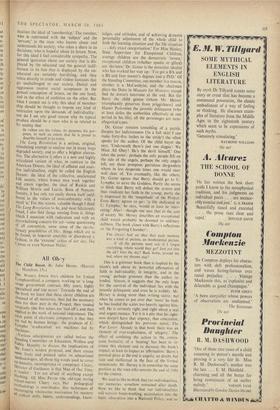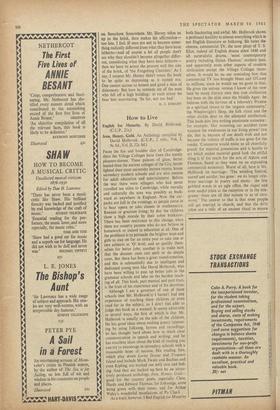All 013 , .‘.y Ti e Child Ilti■er. By John Hersey. (Hamish MR.
WISSI v JONi buss children for United IYmphomilloid. a company working on 'a long- range government contract, fifty years, highly specialised and top secret.' Towards the end of
the book we learn that these clever children are cleansed of all memories, then fed the necessary
data for their part in the Project, then treated surgically (the five senses are 'tied off'), and then applied to the work of national importance. The Weak point of electronic computers is that they fed by human beings : the products of U. 14111pho 're-education' are machines fed by Machines.
Various educationists are called before the ;"landing Committee on Education, Welfare and
ubl ic Morality to discuss the implications of MI'. Jones's modest proposal, and there ensues Npnle lively and pointed satire on educational Methodologies, all those big words used to cover 13P banality, incompetence or conspiracy. Cleary, 141ireetor of Guidance, is that Man of Our Time, .realist': 'I'm not afraid of anything except hlushing.' Of Miss Perrin (the old-type loving sehnol-marm) Cleary says, 'Her pedagogical methodology is unorthodox. Her techniques of encouraging wholesome motivation for mastery of critical skills, habits, understandings, know- ledges, and attitudes, and of achieving dynamic personality adjustment of the whole child to both the learning situation and the life situation . .. defy exact categorisation.' For Miss Henley, State Supervisor for Exceptional Children, average children are the democratic 'norms,' exceptional children (whether spastic or gifted) are 'deviates.' Dr. Gozar is the muscular idealist who has worked her way up: 'I've-got a BA and a BS and four master's degrees and a PhD.' Of the Standing Committee, one member is a moron, another is a MeCarthyist, and the chairman plays the Duke in Measure for Measure, except that he doesn't intervene at the end. But for Barry the child genius (whom Mr. Hersey triumphantly preserves from priggishness) and Master Perkonian the juvenile delinquent (who at least defies the authorities effectively at one period in his life), all the personages are near- allegorical types.
Dr. Gozar remains something of a puzzle. Despite her ludicrousness ('in a full skirt I can make forty-five inches to the stride') she often speaks for the author. Of the child buyer she says, 'Underneath there's just one slogan: We Must All Obey! He's the devil himself.' One takes the point : perhaps the only people lift on the side of the angels, perhaps the only angels left, are these pompous garrulous do-gooders whom in less. desperate times one would steer well clear of. Yet eventually, like the others, Dr. Gozar agrees that Barry should go to U. Lympho, to serve the Goddess. Partly she seems to think that Barry will defeat the system and thus vindicate her faith in the young; partly she is impressed by the 'magnitude' of the Project. Even Barry agrees to go : 'a life dedicated to U. Lynapho,' he says, 'would at least be inter- esting.' Alas!---though one sees that in the sort of society Mr. Hersey describes an exceptional child would probably be doomed to ordinary dullness. The book closes with Barry's reflections on 'the Forgetting Chamber': I've alw s had an idea that each memory was a kind of picture, an insubstantial picture. . . . If all the pictures went out, if I forgot everything, where would they go? Just out into the air? Into the sky? Back home, around my bed, where my dreams stay?
This is a grimmer book than is implied by the blurb's talk about its 'powerful affirmation of faith in individuality, in integrity, and in the young,' perhaps grimmer than the author in- tended. Almost,. it suggests that the only hope for the survival of the individual lies with the juvenile delinquent; and even he is wobbly. Mr. Hersey is doing more than writing- satire; but when he comes to put over that 'more' he finds he has loaded the scales too heavily against him- self. He is certainly right, and right about a real and urgent menace. Yet it is a pity that his right- ness doesn't have that urgency, that concretion, which distinguished his previous novel. The War Lover. Already in that book there was an element of over-explicitness, of 'allegory.' The effect of confining the action to the contin- uous formality of a 'hearing' has been to in- crease this element and to decrease the book's impact, at least its impact as 'affirmation.' Barry's poetical piece at the end is angelic, no doubt, but vain and ineffectual in the face of the formal monstrosity. Mr. Hersey is in somewhat the same position as the man who rewrote the end of l984 for the cinema.
We used to like to think that our individualities, our memories, somehow remained after death. Now we like to think that our individualities will-survive brain-washing, assimilation into the State. absorption into a National Policy, and so on. Somehow. Somewhere. Mr. Hersey takes us up to the brink, then makes his affirmation— too late, I feel. If men are not to become some- thing radically different from what they have been hitherto—and of course a lot of people don't see why they shouldn't become altogether differ- ent, considering what they have been hitherto— then we have to arrest the process well this side of the brink, of 'the Forgetting Chamber.' As I say, I suspect Mr. Hersey didn't mean the book to be quite as depressing as it turned out. One cannot accuse so honest and good a man of dishonesty. But here he reminds me of the man who fell off a high building: at each storey we hear him murmuring, `So far, not too bad.'
D. J. ENRIGHT







































 Previous page
Previous page